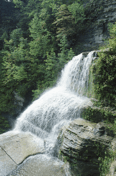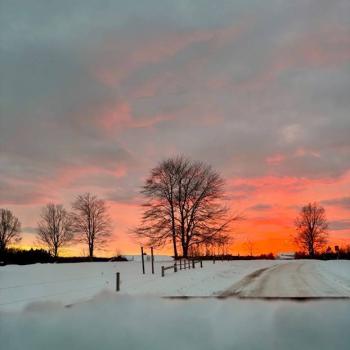By Nancy Wiens - June 2, 2009
 Christians enjoy many forms of prayer as ways to communicate with and deepen our relationships with God. Our biblical ancestors prayed the Psalms as their personal and communal praise and lament. Jesus taught us the Lord's Prayer. We offer petitionary prayers, expressing our deepest longings. In essence, prayer frees us to be our deepest selves with the One whose creating and restoring love compassionately accompanies us in all times and places.
Christians enjoy many forms of prayer as ways to communicate with and deepen our relationships with God. Our biblical ancestors prayed the Psalms as their personal and communal praise and lament. Jesus taught us the Lord's Prayer. We offer petitionary prayers, expressing our deepest longings. In essence, prayer frees us to be our deepest selves with the One whose creating and restoring love compassionately accompanies us in all times and places.
Another meaningful way to pray is with nature. As the human part of nature, we can make a self-conscious and free choice to enter into relationship with God. So, praying with nature as a window into the divine presence deeply reminds us of our identity as part of nature. It, therefore, can draw us even more fully into communion with God, for when we are connected with our deepest selves, we are freed to connect ever more intimately with God. Simultaneously, when we connect intimately with the Creator of the entire universe, we are freed to grow more and more into our deepest, most real selves. Paul seems to be referring to this spiritual experience in 2 Corinthians 3:17-18.
Praying with nature not only frees us to know ourselves and God more deeply, it helps us grow closer to nature itself. Today, the biblical call to love our neighbor extends to nature as the beleaguered, outcast, poor, and "least of these" in this era. Deepening our relationship with nature, then, helps us to respect nature and become its advocate.
This prayer with nature is called an Examen, from the Ignatian tradition. Trusting that God accompanies us all the time, this prayer gives us eyes to see a particular experience afresh, both savoring times we noticed God and noticing when we were unaware of God's presence while we experienced something. In practice, it is actually very simple.
The Prayer
1. Take 30 minutes or more, as you like, to go outside and find a relatively quiet place where you will not be interrupted.
2. Dedicate this time to being with God, in whatever way feels comfortable to you. Ask the Spirit to guide your remembering through your imagination.
3. In your imagination, allow a memory to surface of an early experience you had in nature when you had a deep connection with nature.
4. Return there as fully as you can in your memory. Recall the details of the place: the things you touched, smelled, heard, saw, and perhaps tasted. After reconstructing the experience in your memory, walk around it, so to speak. Who was there? Where was it? What time of day or night? What did your body feel? Take your time remembering these details. Write them down along with whatever else you notice about this experience. Linger with your memory, letting it soak in.
5. Finish your time in nature by simply noticing how you feel in that moment. If any gratitude arises, you can express it to God in whatever way feels most natural. If not, just notice that, too. You may also want to express something to the part of nature with which you have spent this time.
My hope is that this Prayer in Nature will shape how you see nature in the future. This experience you recalled today has been living in you, just waiting for you to attend to it. Hopefully, you will find yourself setting aside time again soon to experience yourself, God, and nature making new memories together.
Nancy S. Wiens is a Presbyterian clergywoman whose ministries include spiritual direction and teaching religion at Dominican University of California. She earned a Ph.D. in Christian spirituality, the dialogue between natural science and theology, and ritual studies at Graduate Theological Union in Berkeley, CA. She is the director and co-founder of the Center for Nature and Christian Spirituality, an apprenticeship and spiritual formation program for young adults in northern California. She also leads wilderness rites of passage to help people discern God's call in nature as they mark life transitions.
1/1/2000 5:00:00 AM




